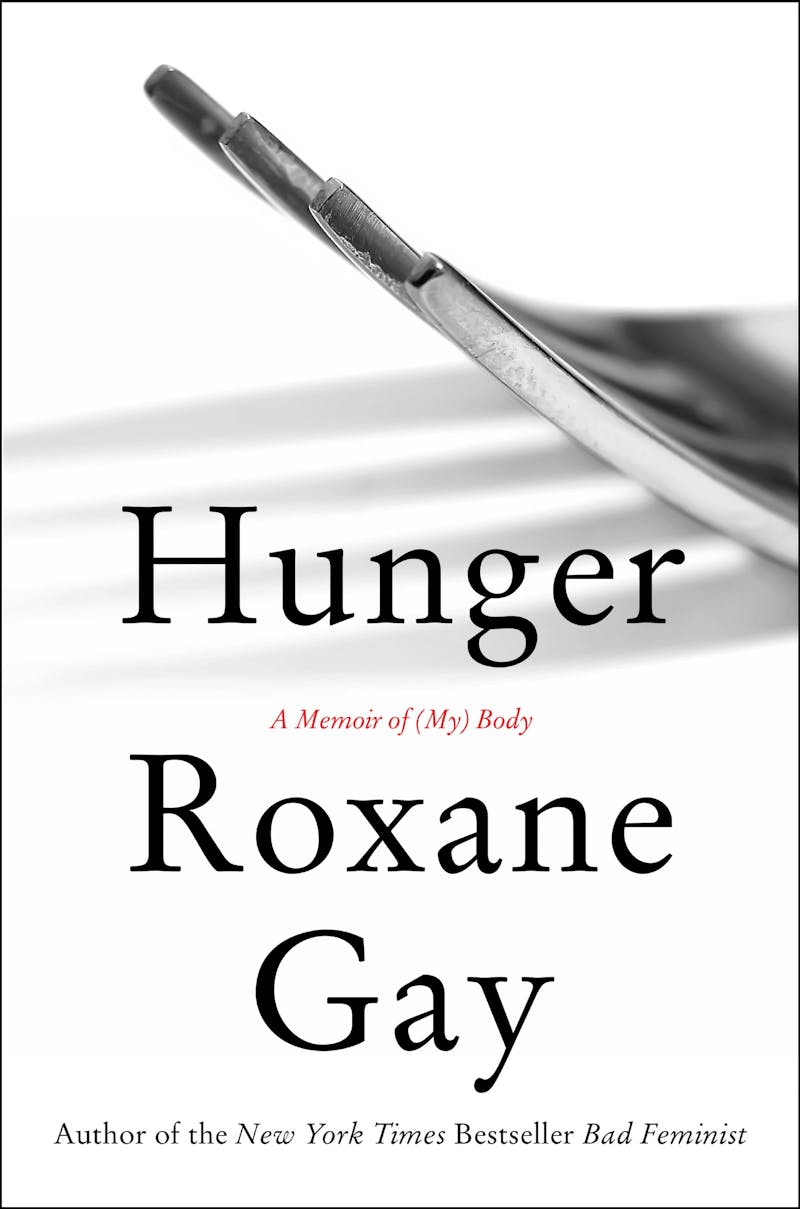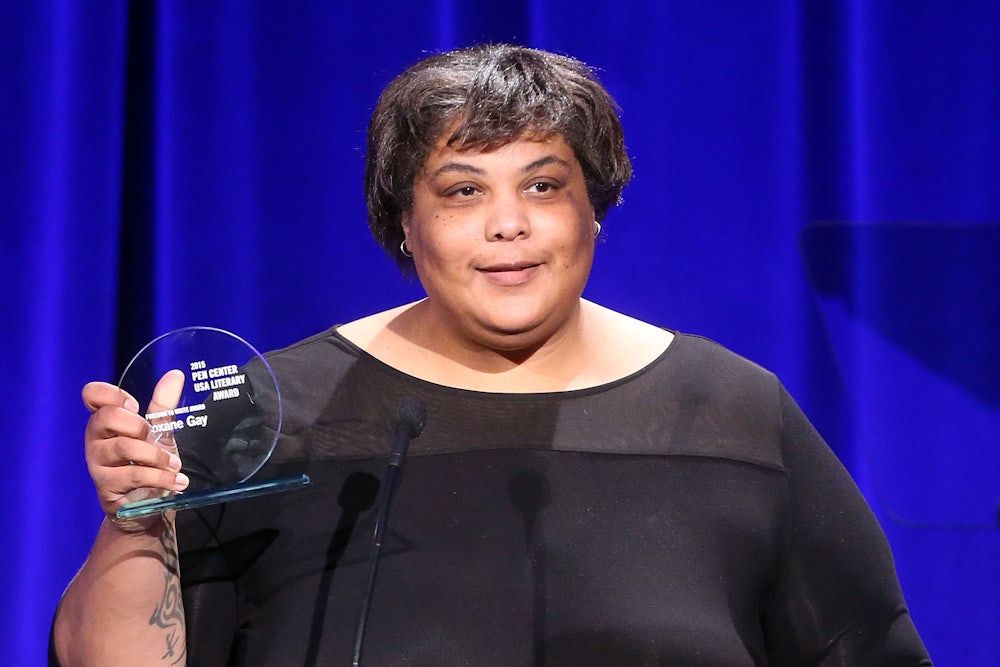Exactly ten days before the publication of Hunger: A Memoir of (My) Body, I asked feminist author Roxane Gay how she felt about the book’s release. “I feel existential dread,” Gay replied almost immediately. Since we were seated on a stage in Berkeley, California, before a crowd of her cheering and clapping fans, it was not the response I expected. Why would a woman best known for telling it like it is, for brazenly calling out white privilege, boldly interrogating her own imperfect embrace of feminism, and exposing the constant and demeaning constrictions imposed on black and female bodies, dread anything at all?

Hunger is, in Gay’s words, “a confession” that bares “the ugliest, weakest, barest parts” of her life and self. A work of staggering honesty, the book chronicles with unsparing acuity the terror of a childhood sexual assault that Gay kept secret for decades; the refuge she sought in food; the armor she thought her weighty self would be, and the cage it became. It is, even for Gay, a lot of truth to tell, and society, we know, is not often kind to truth tellers—even those who are not black and female and entirely unapologetic.
Berkeley was an apt venue to talk with Gay about her book: The feminist group “The Fat Underground,” led by Sara Fishman and others, was born here in the early 1970s, before Gay was born. The group broke off from the National Association to Advance Fat Acceptance (NAAFA) when its members—feminists and fat activists—decided that a more political critique of fat discrimination was necessary. Fat Underground provided just that, asserting that America’s cultural fear of fat was rooted in its fear of powerful women, particularly their sensuality and sexuality. They held that “doctors are the enemy” and “weight loss is genocide.” Other tenets included a recognition that getting thin cannot be a solution to fat people’s problems and that fatness itself is a consequence of biology and not eating habits. Allied with the radical left, the group declared “fat liberation” as its goal. Over four decades later, the Fat Underground agenda lives on in the goals articulated by many fat-positive feminists.
Gay’s book does not overlook the politics of being fat. She excoriates a culture in which “a body is a matter of public record,” the subject of commentary by anyone and everyone. She takes down reality shows like the The Biggest Loser which rely on a staple the “shaming of fat people” and a “a spectacle of contestants pushing themselves in inhuman ways.” She also finds fault with Oprah and her fat-shaming mantra that “inside every overweight woman is a woman she knows she can be.” All of this fat-hating combines to form the wider culture that tells Gay and everyone else who doesn’t fit the ideal of thin that they must discipline their unruly bodies. Presented against Gay’s poignantly told personal account, these observations do not constitute a manifesto, the sort that can be adopted by fat-activists; they are more of an assessment of the cost of these aspersions on fatness.
But Hunger is ultimately a personal story. Gay is careful to emphasize that the story in the book is “her” truth, a history of a very particular and singular body rather than a mapping of a political or activist agenda onto the details of her life. She takes us through her childhood in the Midwest and elsewhere, as the family moved with her father’s job. She tells of family dinners where children were encouraged to speak and where her parents showered both her and her brother with attention and curiosity. It is in the midst of this kind of childhood that catastrophe strikes, and in the course of a single afternoon, in the woods behind her house, Gay’s life is transformed. After the assault, what remains of her is wounded, weighted down by a secret she feels she has to keep. She heads off to boarding school at Phillips-Exeter where she is “presented with an orgy of food.” She indulges in “swallowing her secrets” and making her body “expand and explode.” She believed then that making herself bigger would make her feel safer, making herself difficult to approach, pushing everyone away and even creating a “boundary” between herself and her family, becoming “of them but not.”
She does not of course become safer. In ensuing chapters she documents the struggles of keeping up a front while unraveling inside. That unraveling finally engulfs her and one day she ditches it all: Yale, her education, her family. She leaves for Arizona to live with a man she has met online. Thus begins a dark period in Gay’s life that she calls her “lost year,” one in which she was “reckless” and let men “do terrible things” to her body, letting them hurt her to “finish what had already been started.” It is a period that does end, and when it does it is Gay’s family who bails her out, an always-there-for-you safety net. Gathered up, Gay restarts her life and writes and writes.
In theory, it should bother no one that Gay has chosen to tell a personal story, in which her feelings about her body are inseparable from the life she has lived. It certainly shouldn’t bother the fat-positive activists, whose very project is the acceptance of people who don’t fit society’s prescriptions of how a person should look.
So it would be were it not for the fact that the personal truths that Gay articulates—the confession of trauma, its torturous and decades long inflictions of distress on her psyche, her still ongoing struggle against food—are truths that many fat-positive activists now and before resolutely reject. Gay’s identification of trauma as the root cause of her weight issues, her blunt tying up of her eating with her need for emotional security and even her admitted desire to “feel more comfortable in her body” will grate on those who want unquestioned acceptance for fatness. There is evidence of this emerging critique even before the book’s release, with one fat-positive blogger announcing, “Roxane Gay kinda isn’t my idea of a Shero.” The reason: Gay’s recycling of the “tired” notion of fatness as a distancing mechanism and consideration that fat women may be eating for “other” reasons.
It may be tired, but it is also, for Gay, true. The question that Hunger will pose for fat-positive feminists is whether fat women should be lauded for telling, as Gay has, their whole truths or only those that fit their agenda for social change. A turn toward the latter would undermine what is a crucial and necessary critique of a society obsessed with thinness. It would also push out radically honest writers, who seek through the sharing of their own struggles to embolden others, who suffer similarly and silently. As Gay writes:
And then there is how strangers treat my body. I am shoved in public spaces as if my fat inures me from pain and/or as if I deserve pain, punishment for being fat. People step on my feet. They brush and bump against me. They run straight into me. I am highly visible, but I am regularly treated like I am invisible.
Shared suffering should, one supposes, engender unity among those who carry the burdens and yet this is not so. In recent years, even as the fat-positive movement has gained attention in magazines and popular media, fat-positive feminists have chosen to reject women whose stories include any sort of admission that they desire to change their own bodies. In one telling example, actress Gabourey Sidibe—star of the movie Precious, and author of the recently released memoir This Is Just My Face—was excoriated by fat activists on social media when she came out about her bariatric surgery. “Yet another overweight celebrity who swore she was happy and comfortable with her size has undergone weight loss surgery #GaboureySidibe,” wrote one.
Fat-positive feminism need not and should not require the abridgement of truths, stories told in memoirs like Hunger and This is Just my Face. The myth of cohesion, used so regularly to de-legitimize feminism itself, must not be permitted to inflict a set of standard requirements on fat-positive feminists. We might consider instead the possibility first identified by Susan Bordo in her book Unbearable Weight: That our enduring obsession with disciplining and modifying our own bodies, and compulsively judging and condemning others’, is but an acting out of our helplessness. There is, after all, much that is universal in fat-positive feminism’s agenda, not least the fact that a majority of women are made to feel uncomfortable in their own bodies.
